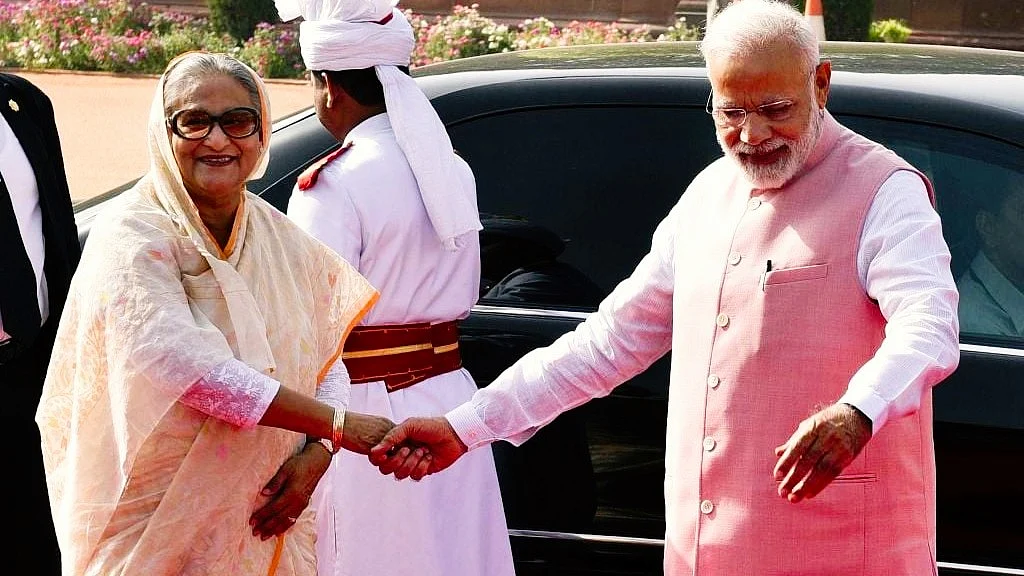Bangladesh: Govt revokes Sheikh Hasina's passport, India extends visa
As per media reports in both India and Bangladesh, India has extended Hasina's visa amid mounting calls from Dhaka for her extradition

Bangladesh's interim government on Tuesday said it has revoked the passport of ousted Prime Minister Sheikh Hasina and 96 others over their alleged involvement in enforced disappearances and the July killings.
However, according to media reports in both India and Bangladesh, India has granted an extension to Hasina's visa amid mounting calls from Dhaka for her extradition. Citing the Hindustan Times, the Dhaka Tribune has reported that Hasina’s visa extension was recently approved by the Union home ministry via the Foreigners' Regional Registration Office (FRRO).
The interim government in Bangladesh formally requested Hasina’s extradition through a note verbale to India’s external affairs ministry on 23 December. However, Indian officials reportedly view the request as incomplete, citing Dhaka’s failure to meet the requisite procedural formalities.
Hasina (77) has been living in India since 5 August 2024, when she fled Bangladesh following a massive student-led protest that toppled her Awami League's (AL) 16-year regime.
Bangladesh's International Crimes Tribunal (ICT) has issued arrest warrants for Hasina and several former cabinet ministers, advisers, and military and civil officials for “crimes against humanity and genocide”.
Addressing a press briefing in Dhaka, chief adviser Muhammad Yunus's deputy press secretary Abul Kalam Azad Majumder said, "The passports department cancelled the passports of 22 people involved in enforced disappearances, while passports of 75 people, including Sheikh Hasina, were revoked due to their involvement in the July killings.”
He, however, did not reveal the names of the remaining individuals whose passports were cancelled, the state-run BSS news agency reported.
On 6 January, the ICT issued arrest warrants against Hasina and 11 others, including former military generals and an ex-police chief, for their alleged role in incidents of enforced disappearances.
This was the second arrest warrant by the ICT against Hasina, and the tribunal has so far recorded three cases against her. "Justice Md Golam Mortuza Mojumdar, chairman of the tribunal, issued the arrest warrant after hearing a prosecution plea,” an ICT official said.
The inspector-general of police was ordered to arrest the 12 people, including Hasina, and produce them before the tribunal on 12 February in the case filed over complaints of enforced disappearances of several hundred people.
The deposed premier’s then-defence adviser Major-General (retd) Tarique Ahmed Siddique and former IGP Benazir Ahmed are among those named in the case. While Siddique is currently under custody, Ahmed is believed to be on the run.
ICT chief prosecutor Mohammad Tajul Islam did not disclose the names of most of the accused “in the interest of investigations and their arrest”.
“The next hearing for this case is also scheduled for 12 February. The tribunal has instructed that the investigation report be submitted on that day if completed,” Islam later told reporters.
He, however, said if the investigation report could not be submitted by then, the law enforcement agencies would have to provide a progress report on the arrests.
Islam told the tribunal that the ousted regime had established a culture of enforced disappearances under state sponsorship.
The chief prosecutor alleged that those involved in carrying out these disappearances were rewarded. He added that agencies like the elite anti-crime Rapid Action Battalion (RAB), the police’s Detective Branch (DB), the Counter Terrorism and Transnational Crime (CTTC) unit, and the Directorate General of Forces Intelligence (DGFI) were most frequently used for the purpose.
"Over the past 15 years, a culture of fear was established in Bangladesh through enforced disappearances and crossfires. Thousands of people were abducted by various forces, either in plainclothes or in uniform. Most of them never returned,” Islam told journalists.
With PTI inputs
Follow us on: Facebook, Twitter, Google News, Instagram
Join our official telegram channel (@nationalherald) and stay updated with the latest headlines
Published: 08 Jan 2025, 5:13 PM
